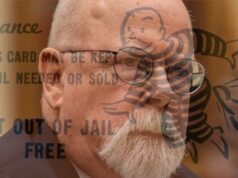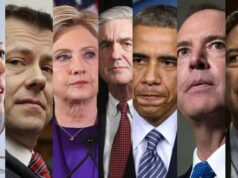Zoom out. What’s it all about?
In Part One and Part Two of this Alfa Bank Hoax Series, we discussed former British MI6 intelligence officer Christopher Steele and Fusion GPS co-founder Glenn Simpson falsifying evidence on Donald Trump. But what is rarely talked about is their falsifying evidence on Alfa Bank. How did Steele have the guts to frame some of the richest men in Russia? In Part 3 of this series, we will dive into Alfa Bank and how they were framed in both the Alfa Bank Hoax with Donald Trump—as well as in other hoaxes.
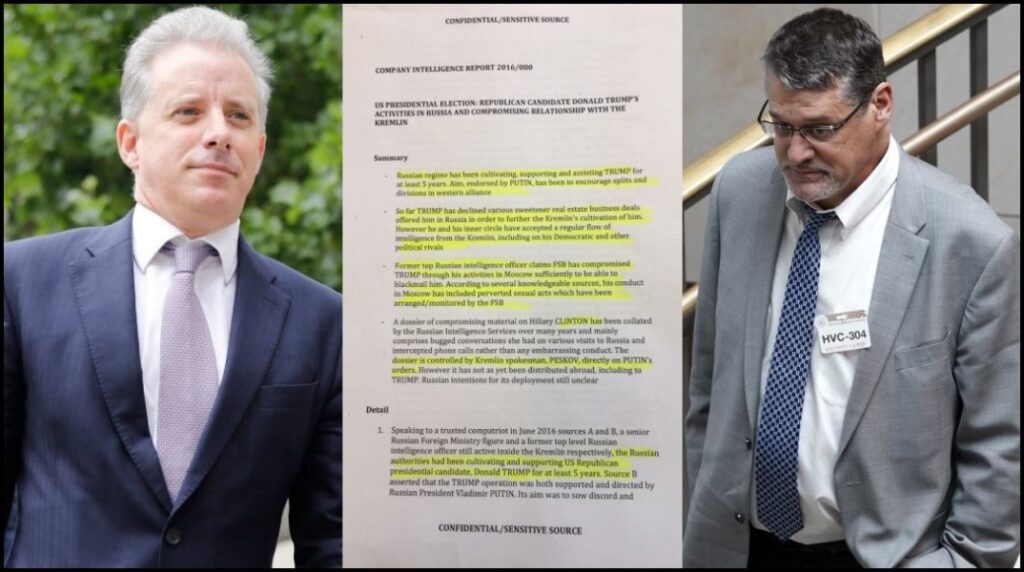
Many nefarious deeds have been attributed to Alfa Bank over the years by various entities in the United States Government. Some may be true—as I don’t think you become powerful in Russia without some malfeasance—but some attributions are quite laughably made up.
The false reports that Alfa Bank set up a secret communication with The Trump Organization as some grand scheme to help Donald Trump during the 2016 presidential election was discussed in the first two articles of this series. Alfa Bank sued various organizations about this accusation that was widely spread by Christopher Steele in several memos given to the media and the FBI. Alfa Bank sued BuzzFeed for printing the dossier that alluded Alfa Bank was using a secret “backchannel” with the Trump Team. Alfa Bank also sued Christopher Steele and Glenn Simpson for slander. On August 21st, 2018, a judge dismissed Alfa Bank’s lawsuit against Steele stating Alfa Bank owners were unable to prove actual malice occurred. None of Alfa’s lawsuits made it past preliminary filings in America. Alfa Bank recently dropped their suit in March 2022 against Glenn Simpson’s company—Bean LLC—stating to the federal court the parties jointly agreed “that this action be dismissed with prejudice as to all claims.”
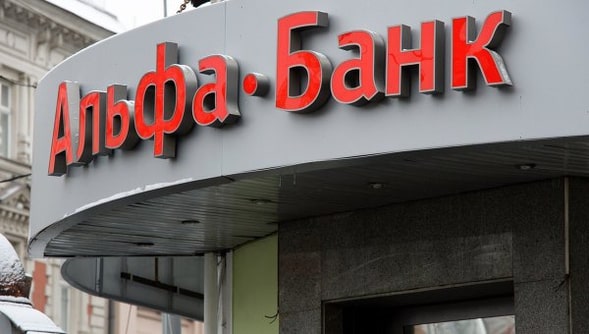
The only country Alfa Bank had some success in was the United Kingdom. The judge stated that Steele “failed to take reasonable steps to verify the allegation was false” and Steele was ordered to pay each of the bankers $23,000. Of course, the plaintiffs—Mikhail Fridman and Peter Aven—had spent millions of dollars to try to erase the damage Hillary Clinton’s team had done to their reputations. They hired expert computer analysts to determine whether the Alfa Bank Hoax had been falsified. Two computer forensic firms—Mandiant and Stroz Friedberg—both came to the conclusion; there had been no communication between Alfa Bank and The Trump Organization. This conclusion seemed to be backed up by FBI agent Scott Hellman, an expert in the bureau’s Cyber Division for over fourteen years. Hellman’s succinct quote about the Alfa “dossier” —Clinton attorney Michael Sussmann brought to the FBI—was that whoever provided this white paper to Sussmann was,
“suffering from a mental disorder.”
Hellman figured out this farce in less than twenty-four hours, but somehow the Senate was still eager to receive an additional 600 pages of mental musings from the entire cast of characters that worked on the original hoax. These characters included Daniel Jones, Christopher Steele, Glenn Simpson, Rodney Joffe, April Lorenzen, and David Dagon.
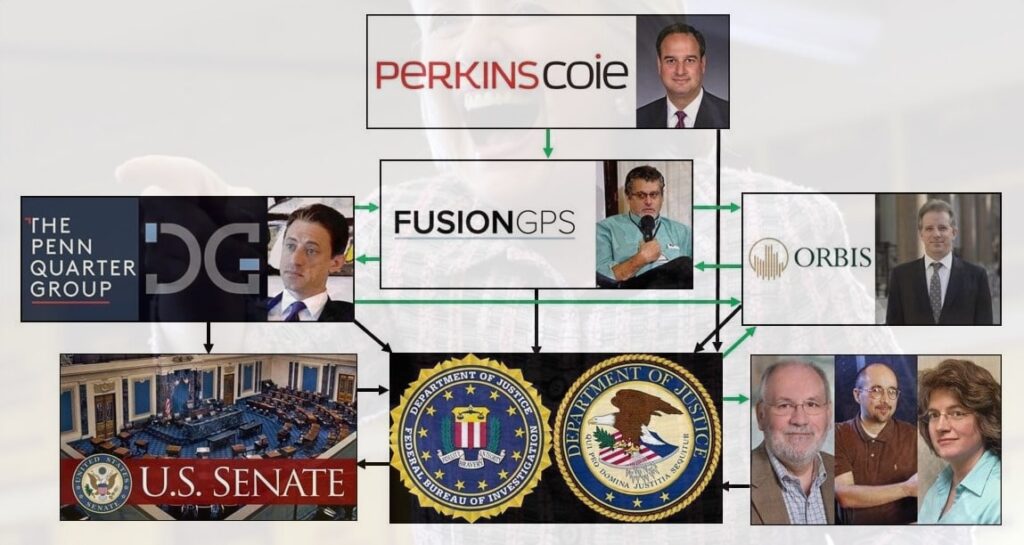
So, is this an anomaly? Why was bogus evidence allowed to be resubmitted to Congress after Trump became President?
White papers about Trump have been scrutinized by independent media. And more Americans have become aware of the political weaponization of our federal institutions. There is now a crack in the veneer that has exposed the active measures put forth by our government.
Active measures are disinformation plots used for political warfare and are implemented by all countries—including the United States. Active measures are also secret and deceptive operations within governments. America will implement this weapon against adversaries, but who an adversary can be is at the discretion of a faceless hyper-partisan technocrat. Sometimes the target is a domestic politician that the elite beltway has decided isn’t worthy of the presidency; these faceless federal employees and federal contractors decide “all’s fair in war” and justify active measures on anyone.
In the case of the Alfa Bank Hoax, these players framed powerful Russian businessmen in an organized false flag to dirty up Hillary Clinton’s opposition. Perhaps they never thought the origin of the lie would ever be exposed to the public. Perhaps this is why Christopher Steele rushed off from his home—leaving his neighbor to take care of his cat—after The Wall Street Journal (WSJ) stated Steele’s company Orbis was the author of the libel.
Also, it wasn’t the first time Steele’s fellow researcher—Glenn Simpson—wrote about Alfa Bank. He was well-versed on much of Alfa Bank’s history and had written many articles about lawsuits involving the founders. Simpson even outlined which lobbying firms Alfa Bank paid to help clean up its reputation in the past in his April 17th, 2007 WSJ article—titled ‘How Lobbyists Help Ex-Soviets Woo Washington’.
In 1993, Alfa Bank hired Kroll Consultancy for $500,000 to write reports asserting accusations against Alfa Group for trafficking heroin from Burma to Germany appears fabricated and not credible. It was a successful whitewash campaign and many of the most liberal think tank minds of the day were praising Mikhail Fridman and Peter Aven. Carl Bildt—who was a member of Ukraine’s International Reform Council—would consult with Fridman on building Ukraine’s economy. Fridman’s Telecom company KyivStar was heavily promoted by Western investors. Edward Lucas and Anders Aslund—two Putin critics—came to the defense of Carl Bildt and his relationship with Mikhail Fridman with Aslund, stating,
“Alfa has moved out of Russia and stayed out of politics. In what way has Carl Bildt done anything wrong?”
Simpson learned there were lucrative jobs in private research that newspaper work couldn’t match. Why write for the WSJ reporting Kroll was paid by Alfa Bank when you could hang out your own shingle and cash in? Simpson could be a smear merchant or a clean-up crew depending on the needs of well-paying clients.
Glenn Simpson’s company, FusionGPS, was paid over 3.3 million dollars alone from the nonprofit company TDIP in 2017 to assist in the Alfa Hoax white paper given to Congress. When millions are being deposited into your bank account, you may be less than thorough in vetting the claims of your “expert” sources. In the case of the Alfa Bank Hoax, the source’s motives certainly should have raised some eyebrows.
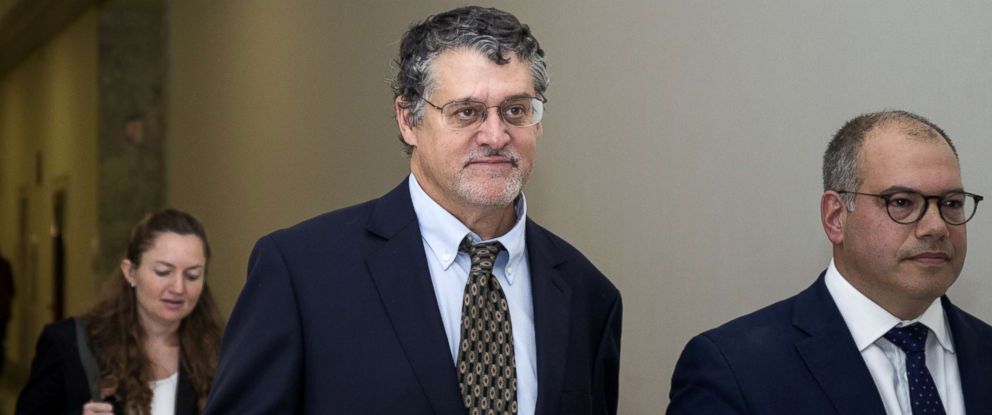
Earlier in 2007—before Simpson’s article about Alfa Bank paying big money for lobbying—Glenn wrote another article detailing an ongoing Alfa Bank legal battle that spread across at least five countries. It’s a complicated case between Russian Telecom oligarchs fighting for their piece of the market. One of these oligarchs, Leonid Reiman, owned the telecom company IPOC, and also happened to be Putin’s Telecom Minister at the time. Reiman was accused of pushing one of Alfa Bank’s Telecom companies, VimpelCom, out of the market with over regulations and tax burdens.
There was a lot of finger-pointing and mudslinging between all players involved. Leonid Rozhetskin, an American born in Russia, was also caught up in the IPOC vs. Alfa Group case. Glenn Simpson covers Reiman and Rozhetskin’s involvement in the article “Why Putin’s Telecom Minister Is in Investigator’s Sights Abroad”. Rozhetskin was a Harvard-educated lawyer who founded Russia’s first investment bank—Renaissance Capital—along with fellow American Boris Jordan and New Zealander Stephen Jennings. Rozhetskin never denied signing over his shares of Russian mobile operator MegaFon to Reiman, but states Reiman in-fact forced him to do so. Alfa argued Rozhetskin had no right to sell to Reiman, and in 2007, a court in the British Territory of Bermuda agreed to mediate the dispute. In 2008, Rozhetskin went missing. Large stains identified as his blood were found in his apartment, and traces of the blood in the backseat of his car. The car was last seen leaving his Riga, Latvia apartment at 7:30 in the morning the day after his last sighting. Years later, his body was found in the woods near where his car was abandoned, but no one to date has been indicted for his murder.

Rozhetskin’s disappearance shook up the industry just as much as the 2004 murder of American journalist Paul Klebnikov, who had penned the book Godfather of the Kremlin—a biography about Russian businessman Boris Berezovsky. The media outlet Radio Free Europe/Radio Liberty pointed to the fact Paul Klebnikov was also looking into Alfa Bank’s business dealings, and alluded to Alfa’s involvement in the brazen assassination of Klebnikov. A 2007 Stratfor report went so far as to tie Klebnikov’s murder to Alfa Group, stating,
“An official within Putin’s inner circle told Stratfor that before his death, Klebnikov was investigating Alfa’s activities regarding IPOC, MegaFon, and Azerbaijani oil.”
A report like the Stratfor report could certainly influence the public’s perception of a company, and those attributing Alfa to some serious misdeeds were just warming up. It seems like the master of influencing the media would enter the fray shortly after he was expelled from Russia in a dramatic fashion. U.K. financier, Bill Browder, would perhaps be the most prolific fabricator of brazen attributions to Alfa Bank. His cavalier accusations could strain the logic of even the most credulous Browder admirer.
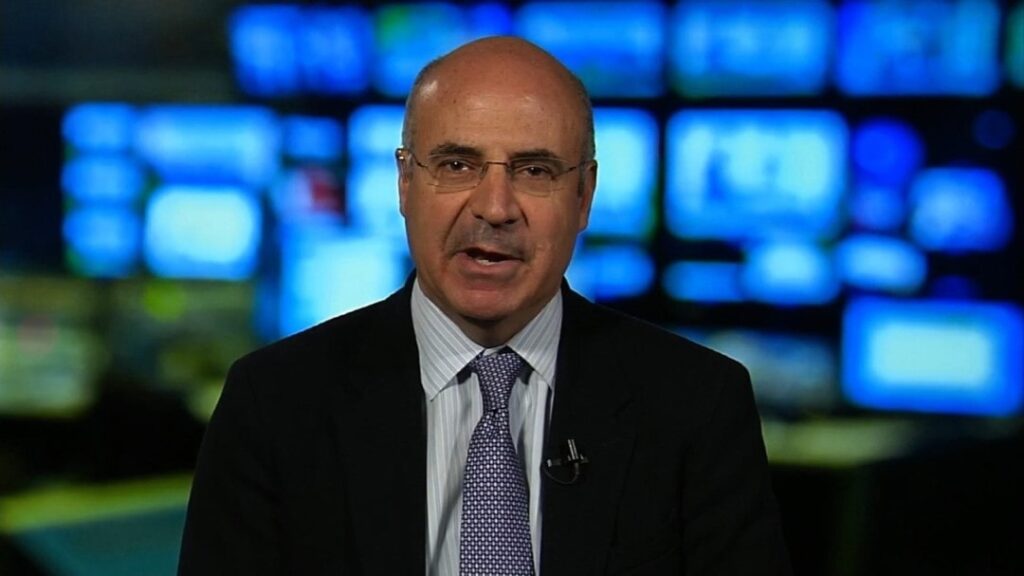
After Russia accused Browder of stealing over $200 million from the Russian Treasury, he turned around and accused no less than 20 countries, 50 individuals, over a dozen banks, and dozens more LLCs of the very same tax heist. If you add up all those accused, the amount multiplies at least tenfold from the original $213 million alleged. Bill Browder accused Renaissance Capital—Rozhetskin’s investment company—of being behind the elaborate theft from the Kremlin coffers. Browder then seemed to drop those accusations, and instead stated it was Ruben Vardanyan—through his Troika Dialog Company—that actually stole the money. Browder went on to switch gears again, and accused Sergey Roldugin, Ukrainian President Victor Yanukovych, and Denis Katsyv of orchestrating the heist. While he was switching who perpetrated this crime, he would always place Alfa Bank— more specifically, Bank Krainiy, a subsidiary of Alfa Bank—at the center of the money laundering operation. Browder would make elaborate flowcharts for various media outlets, government bodies, and research companies. Below are a sampling of flowcharts that made it into newspapers and depositions at different times.
Flowchart involving Alfa Bank laundering money for Yanukovych:
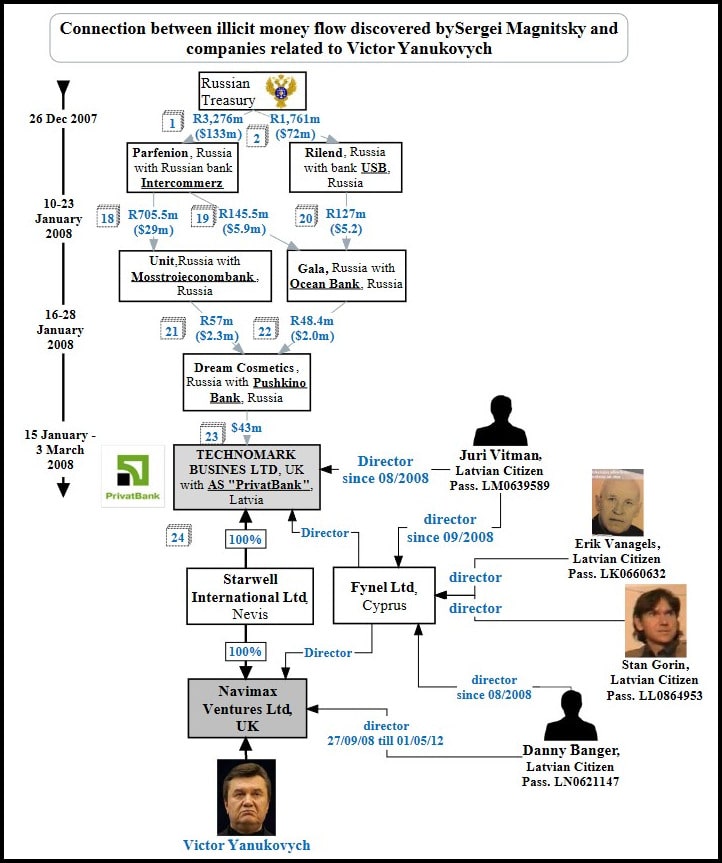
Flowchart submitted as an exhibit in the United States v. Prevezon Holdings Ltd. case in the Southern District of New York (SDNY):
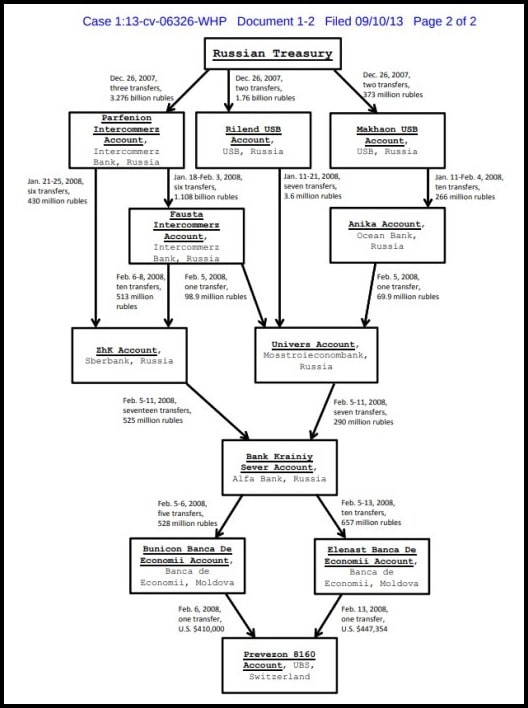
Flowchart associated with a Latvian complaint related $230K in seized real estate.
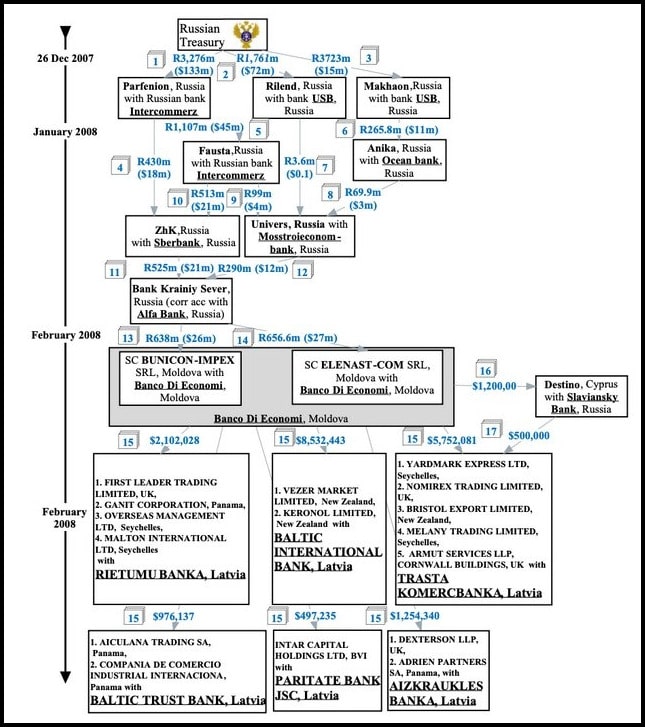
These flowcharts are just a few examples of the attribution given to Alfa Bank by Browder for laundering of the $213 million stolen from the Russian Treasury back in 2007. Did Bill Browder falsely accuse each of these entities of being involved in a crime he himself masterminded?
When Paul Behrends, a staffer for the House of Representatives, started looking into all the attributions, Bill Browder quickly labeled him a Putin puppet. Behrends’s good friend said,
“Paul viewed Browder’s lobbying for the Magnitsky Act as a foreign anti-American operative’s exploitation of American Law to drag the United States into Russian Internal gang wars under the false flag of human rights.”
A tremendous amount of lobbying went into pushing Browder’s narrative. His main lobbyist—Juleanna Glover, a former Dick Cheney press secretary—would accompany Browder on his whirlwind book tour promoting Red Notice.
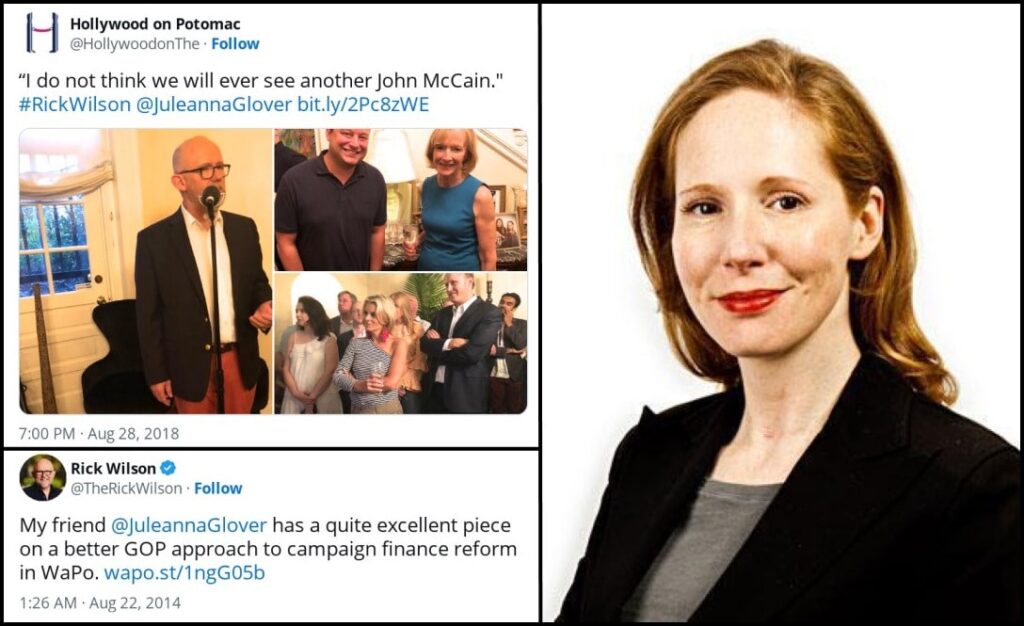
Why would Browder be so brazen to accuse Alfa Bank of being the launderer? I don’t know. The same reason I don’t know why Chris Steele and Glenn Simpson accused Alfa Bank of setting up secret backchannel communication with the Trump organization, but it’s odd.
Like Glenn Simpson was knowledgeable about Alfa Bank’s business dealings by writing about them in the WSJ, Bill Browder was also knowledgeable by working for a company that did some of the underwriting for the telecom industry in his early years in Russia.
Bill Browder went to Russia in 1992 while working for Salomon Brothers. During those years, Salomon Brothers was helping to raise money for the telecom sector, including for Petersburg Long Distance and its subsidiary PeterStar Company. For some reason, Bill Browder omits in his book that Salomon Brothers worked closely with Vladimir Putin, then First Deputy Mayor in St. Petersburg.
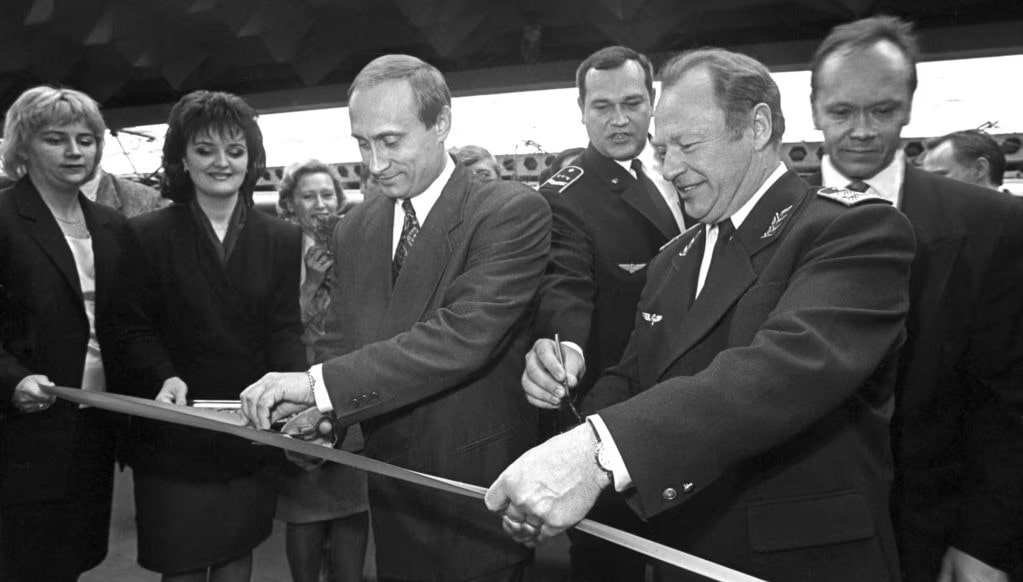
Glenn Simpson discusses the relationship in his Senate testimony. Simpson recalls how PeterStar became the subject of a massive corruption investigation that led to the resignation of Telecom Minister, Leonid Reiman. Simpson states,
“Bill Browder did business with the mayor’s office in Saint Petersburg when Vladimir Putin was the deputy mayor and was responsible for dealing with western businessmen and corporations.”
The problem with trying to sort out all these attributions to Alfa Bank is you have to look at the motives behind the accusers. For Glenn Simpson, he was given $3.3 million from a nonprofit company TDIP to submit a report about Alfa Bank setting up a backchannel to the Trump Organization. Millions of dollars is certainly an incentive. Steele was also paid handsomely by the Clinton campaign to try to tie Trump to Russia.
Padding his bank account also gave Steele some incentive to accuse Alfa Bank of conspiring to help get Trump elected. Steele would even accuse American Sergei Millian of being the intermediary between Alfa Bank and the Trump Organization.
Will Durham get to the bottom of these attributions? Unfortunately, some of these attributions go far deeper than political smear campaigns. They are woven into active measures that are planned in the recesses of Intelligence agencies willing to believe “all’s fair in war.”
Durham is not trying to find transparency on active measures. He is just another firewall to operational disinformation that is used on adversaries—both foreign and domestic. Unfortunately, in our present political climate, the adversary has become anyone curious to ask questions in these operations.
Paul Behrends certainly found this out the hard way. And speaking to one of Behrends closest friends, I learned that Paul believed Bill Browder was behind him losing his job as staff director for the House Foreign Affairs subcommittee. Paul was a victim of Spygate like so many others.
Browder and Steele’s fabricated research is a feature of active measures. Browder’s flowcharts were submitted into evidence by our DOJ. In fact, the Department of Homeland Security investigator assigned to the US vs Prezevon case, Todd S. Hyman, stated that all of their evidence was hand-delivered to them by Bill Browder. You can watch his video deposition on YouTube.
Steele’s fabrications were used by various agencies. The DOJ used them verbatim with copied and pasted lines embedded into a FISA warrant on Carter Page. They were used by the CIA as part of an Intelligence Community Assessment briefing given to the Obama administration on January 5th, 2017 in a two-page summary titled “Annex A.”
Steele’s dossiers were then weaponized by the FBI when then-Director James Comey discussed the dossier directly with President-elect Trump.
It all leads back to that tangled web we weave.
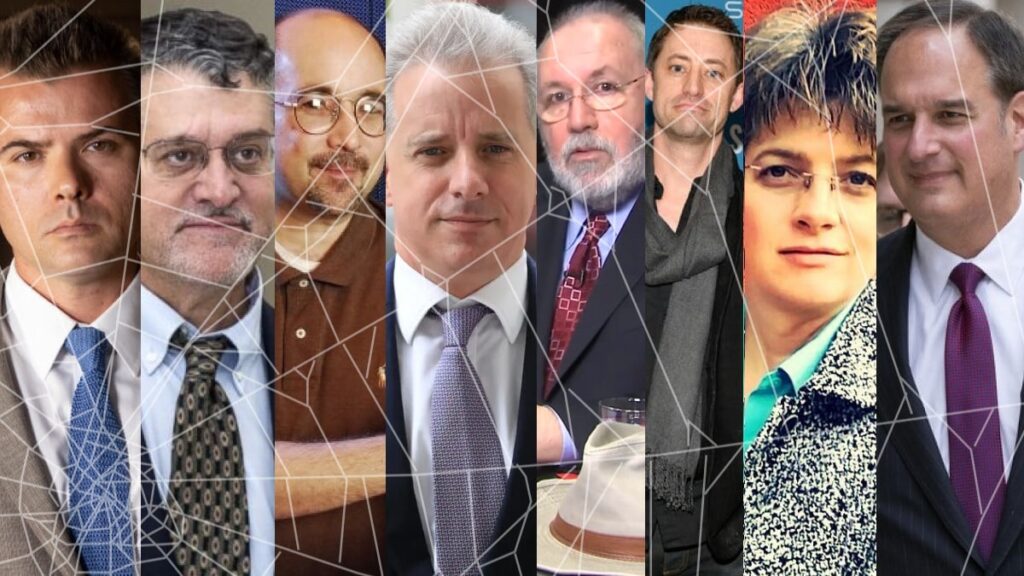
Felix Sater seemed to know something.
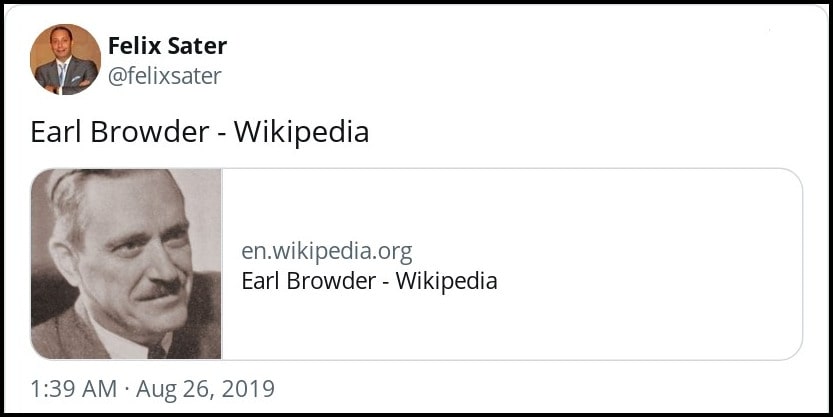
And, apparently, so did Carter Page.
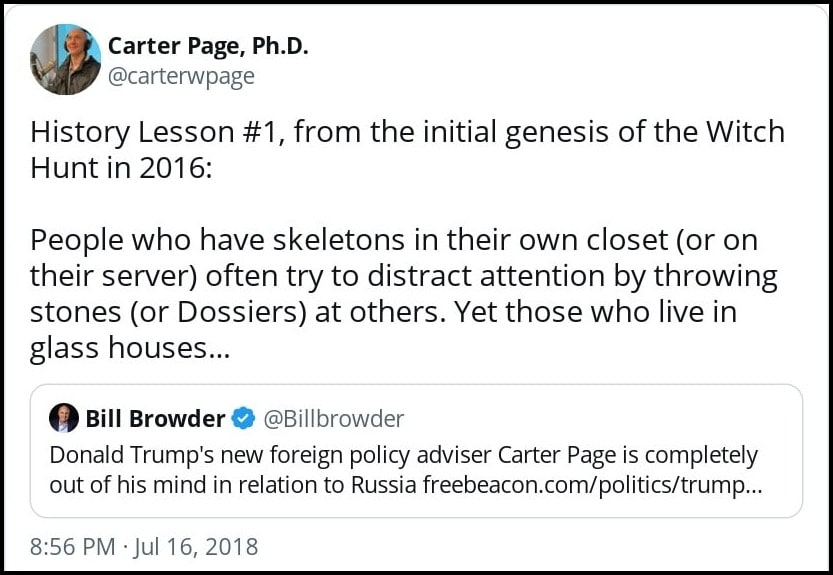
So … What’s It All About, Alfa?
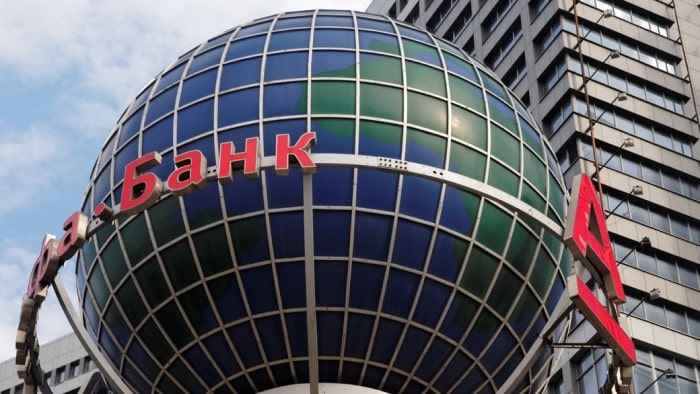
The Washington Pundit | Speak Truth To Power
Author of Dragon Games: Based on a True Story of Sergei Millian, The Hermitage Effect: How Bill Browder and her fiction book Buried Treasure. Lives in Massachusetts.





